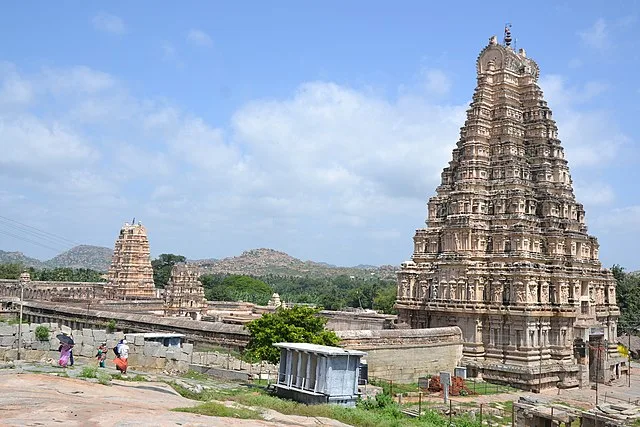Hampi, located in the southern state of Karnataka, India, is a place that takes you back in time to the golden era of the Vijayanagara Empire. Recognized as a UNESCO World Heritage Site, this ancient city mesmerizes visitors with its sprawling ruins, majestic temples, and captivating landscapes.
Historical Significance
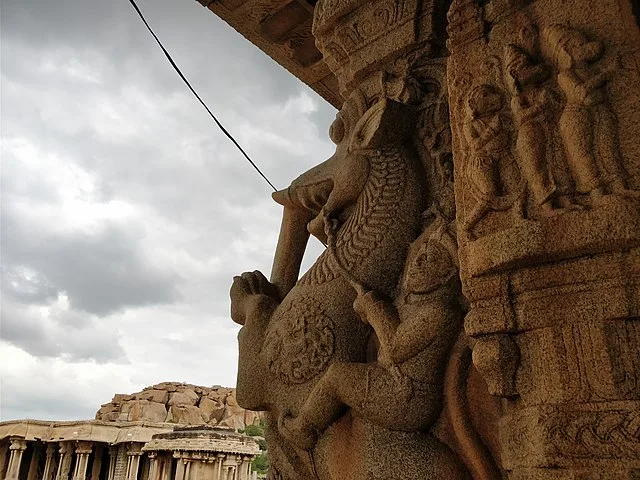
The Vijayanagara Empire
Hampi was once the capital of the mighty Vijayanagara Empire, one of the greatest Hindu empires in Indian history. Flourishing between the 14th and 16th centuries, it was a center of art, culture, and trade.
UNESCO World Heritage Site
Designated as a UNESCO World Heritage Site in 1986, Hampi stands as a testament to the architectural brilliance and cultural richness of the bygone era.
Geographical Overview
Situated on the banks of the Tungabhadra River, Hampi boasts a unique landscape characterized by granite boulders, lush banana plantations, and scenic hills.
Top Attractions in Hampi
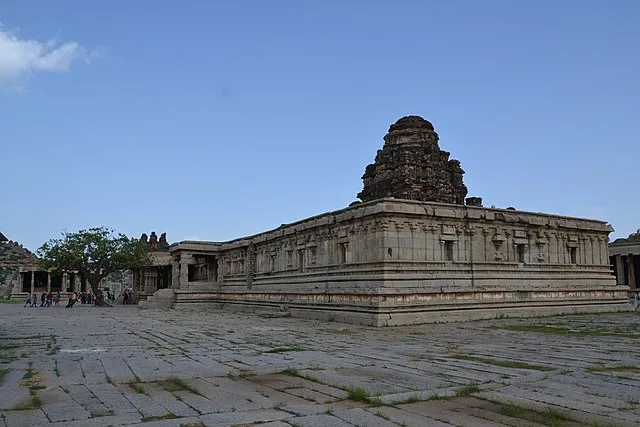
Virupaksha Temple
Dedicated to Lord Shiva, the Virupaksha Temple is Hampi’s most revered religious site, dating back to the 7th century. Its towering gopuram (gateway tower) and intricate carvings attract pilgrims and tourists alike.
Hampi Bazaar
Adjacent to the Virupaksha Temple, the Hampi Bazaar is a bustling market street offering a glimpse into the city’s vibrant past. Visitors can shop for souvenirs, traditional handicrafts, and delicious street food.
Vitthala Temple
Famed for its iconic stone chariot and musical pillars, the Vitthala Temple is a masterpiece of Dravidian architecture. The temple complex is adorned with intricate sculptures and hosts the annual Hampi Utsav, a cultural extravaganza.
Elephant Stables
Built to house the royal elephants of the Vijayanagara Empire, the Elephant Stables showcase a blend of Hindu and Islamic architectural styles. This imposing structure is a testament to the grandeur of Hampi’s royal court.
Activities for Visitors
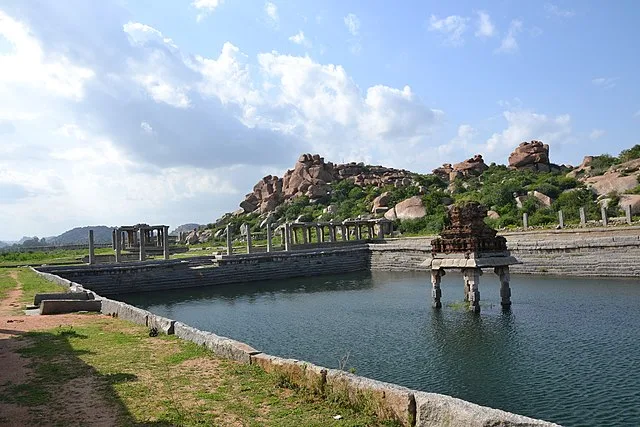
Exploring Ruins
Hampi is a paradise for history enthusiasts and photographers, with countless ruins scattered across its landscape. Visitors can wander through ancient temples, palaces, and fortifications, marveling at the intricate craftsmanship of yesteryears.
Climbing Matanga Hill
For panoramic views of Hampi’s ruins and surrounding countryside, adventurers can embark on a trek up Matanga Hill. The sunrise and sunset vistas from the summit are truly awe-inspiring.
Coracle Rides
Experience the serenity of the Tungabhadra River with a traditional coracle ride. These round, bowl-shaped boats offer a tranquil way to explore Hampi’s riverside temples and picturesque landscapes.
Culture and Traditions
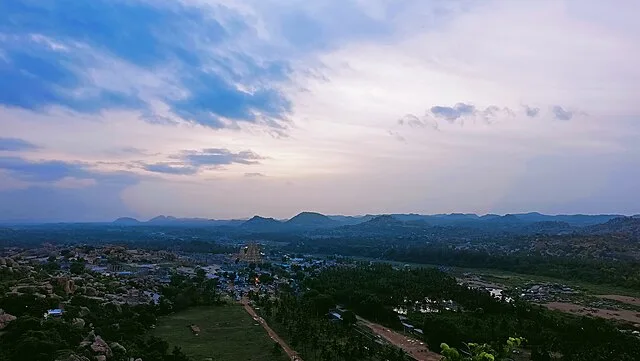
Local Cuisine
Indulge in the flavors of Karnataka with Hampi’s delectable cuisine, featuring dishes like dosas, idlis, and bisi bele bath. Don’t miss the opportunity to savor a traditional South Indian thali at one of the local eateries.
Festivals and Celebrations
Immerse yourself in Hampi’s vibrant culture by participating in festivals like Hampi Utsav and Virupaksha Car Festival. These colorful celebrations showcase traditional music, dance, and rituals, offering a glimpse into the region’s rich heritage.
Accommodation Options
Hotels and Resorts
Hampi offers a range of accommodation options, from luxury resorts to budget-friendly guesthouses. Visitors can choose to stay in heritage properties with modern amenities or eco-friendly resorts amidst nature.
Homestays
For a more immersive experience, consider staying with a local family in a traditional homestay. This allows travelers to interact with residents, learn about their customs, and relish home-cooked meals.
Transportation

How to Reach Hampi
The nearest major airport to Hampi is in Hubli, approximately 160 kilometers away. From there, visitors can take a taxi or bus to reach Hampi. The city is also well-connected by rail and road networks.
Getting Around
Within Hampi, tourists can explore on foot, bicycle, or by hiring auto-rickshaws or motorcycles. Guided tours are also available for those who prefer a structured itinerary.
Best Time to Visit
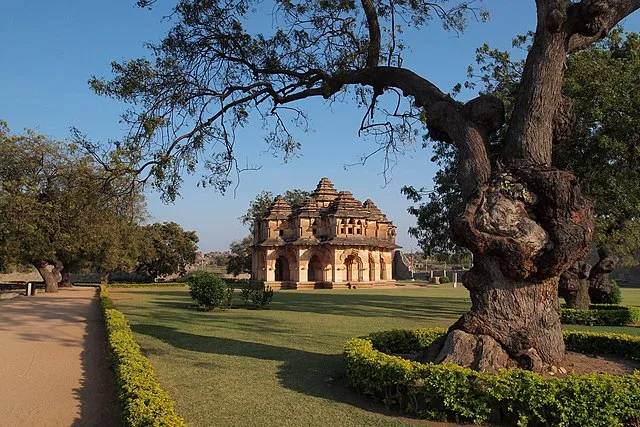
The best time to visit Hampi is during the winter months, from October to March, when the weather is pleasant for sightseeing and outdoor activities.
Preservation Efforts
Efforts are underway to preserve and protect Hampi’s archaeological treasures from encroachment and vandalism. Conservation projects aim to safeguard the city’s heritage for future generations to cherish.
Impact of Tourism
While tourism has brought economic opportunities to Hampi, it also poses challenges such as environmental degradation and overcrowding. Sustainable tourism practices are essential to mitigate these impacts and ensure the long-term sustainability of the destination.
Tips for Travelers
- Carry sufficient water and sun protection while exploring Hampi, as the climate can be hot and dry.
- Respect the cultural and religious sentiments of the locals, especially when visiting temples and sacred sites.
- Dress modestly and remove footwear before entering religious places.
- Dispose of waste responsibly and avoid littering to help maintain the cleanliness of Hampi’s surroundings.
- Engage with authorized guides for accurate information about Hampi’s history and significance.
Conclusion
Hampi, with its rich history, architectural marvels, and scenic beauty, offers a captivating journey through time. Whether you’re a history buff, an adventure seeker, or a cultural enthusiast, Hampi has something to offer for everyone. Explore the ruins, savor the local flavors, and immerse yourself in the charm of this UNESCO World Heritage Site.
FAQs
- Is Hampi safe for solo travelers?
- Yes, Hampi is generally considered safe for solo travelers. However, it’s advisable to exercise caution and stay alert, especially when exploring remote areas or traveling at night.
- Are there any restrictions for visiting Hampi’s temples?
- Visitors are expected to adhere to certain rules and regulations when visiting Hampi’s temples, such as dressing modestly, removing footwear before entering, and refraining from photography in certain areas.
- What is the significance of Hampi’s stone chariot?
- Hampi’s stone chariot, located within the Vitthala Temple complex, is an architectural marvel renowned for its intricate carvings and symbolic representation of the divine chariot of Lord Vishnu.
- Can I hire a guide in Hampi?
- Yes, licensed guides are available for hire in Hampi to provide insights into the city’s history, architecture, and culture. It’s recommended to engage with authorized guides to enhance your experience and support local tourism.
- What are some offbeat attractions in Hampi?
- In addition to its famous landmarks, Hampi also boasts several offbeat attractions worth exploring, such as the Hemakuta Hill Temples, Queen’s Bath, and Lotus Mahal.

